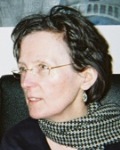 Diane Proudfoot is Associate Professor of Philosophy at University of Canterbury in New Zealand. We invited her to answer the question “What does philosophy of religion offer to the modern university?” as part of our “Philosophers of Religion on Philosophy of Religion” series.
Diane Proudfoot is Associate Professor of Philosophy at University of Canterbury in New Zealand. We invited her to answer the question “What does philosophy of religion offer to the modern university?” as part of our “Philosophers of Religion on Philosophy of Religion” series.
Alma is a smart mathematics student, taking a philosophy of religion course as an elective. She is fired up by the passion of the new atheists. In the class she reads Anselm for the first time. The teacher takes Anselm’s side, using his intricate arguments to bat away the cruder positions of Dawkins and Harris. Alma, at first grudgingly and then with signs of real enjoyment, writes as her assignment a debate between Pascal and Hitchens. Hitchens still wins but Alma signs on for a double major in mathematics and philosophy.
Bart is studying sociology and anthropology, and has already taken classes in the sociology of religion. The philosophy course is merely a filler. As far as Bart is concerned, philosophy of religion is an anachronism—‘Truth, there’s no such thing’ he says confidently. Many of the other students in the class are survivors of epistemology and metaphysics courses, and they poke holes in Bart’s naïve relativism. Bart is at a loss until he learns how to counter his classmates’ arguments. He goes on, nevertheless, to use the very same arguments against his sociology professors.
Carl has had a religious education and is still unsure whether or not to enroll in seminary. He is a serious, older student taking time out from his work as a history teacher; he signed up for a philosophy of religion class with the assumption that it would be a theology primer. Initially Carl finds the expectation that he clarify and even justify his faith (or justify his lack of justification) subversive and discomfiting. Then he begins to separate those of his beliefs that he considers up for scrutiny from those that remain sacrosanct. There is far more of the former than he ever suspected, and Carl finds this liberating.
These three case studies (composites of real individuals) illustrate the fact that, at its best, analytic philosophy of religion offers students a rare opportunity to have their preconceptions about fundamentals uncovered and challenged. With this comes the possibility of growth and change. Students also develop the skill of open-minded analysis. Employers and academic guardians of liberal values should—and in my experience do—value this skill highly.
If philosophy of religion is to remain a powerful tool for change, however, it must escape from the staid mid-20th century curriculum. It must include serious discussion of current science, the implications and problems of religious diversity, and the ethics of religious freedom. These are the topics in the media and at the forefront of students’ minds.
I am writing this blog from Jerusalem. Anyone in modern universities who thinks that philosophy of religion is irrelevant should visit.
